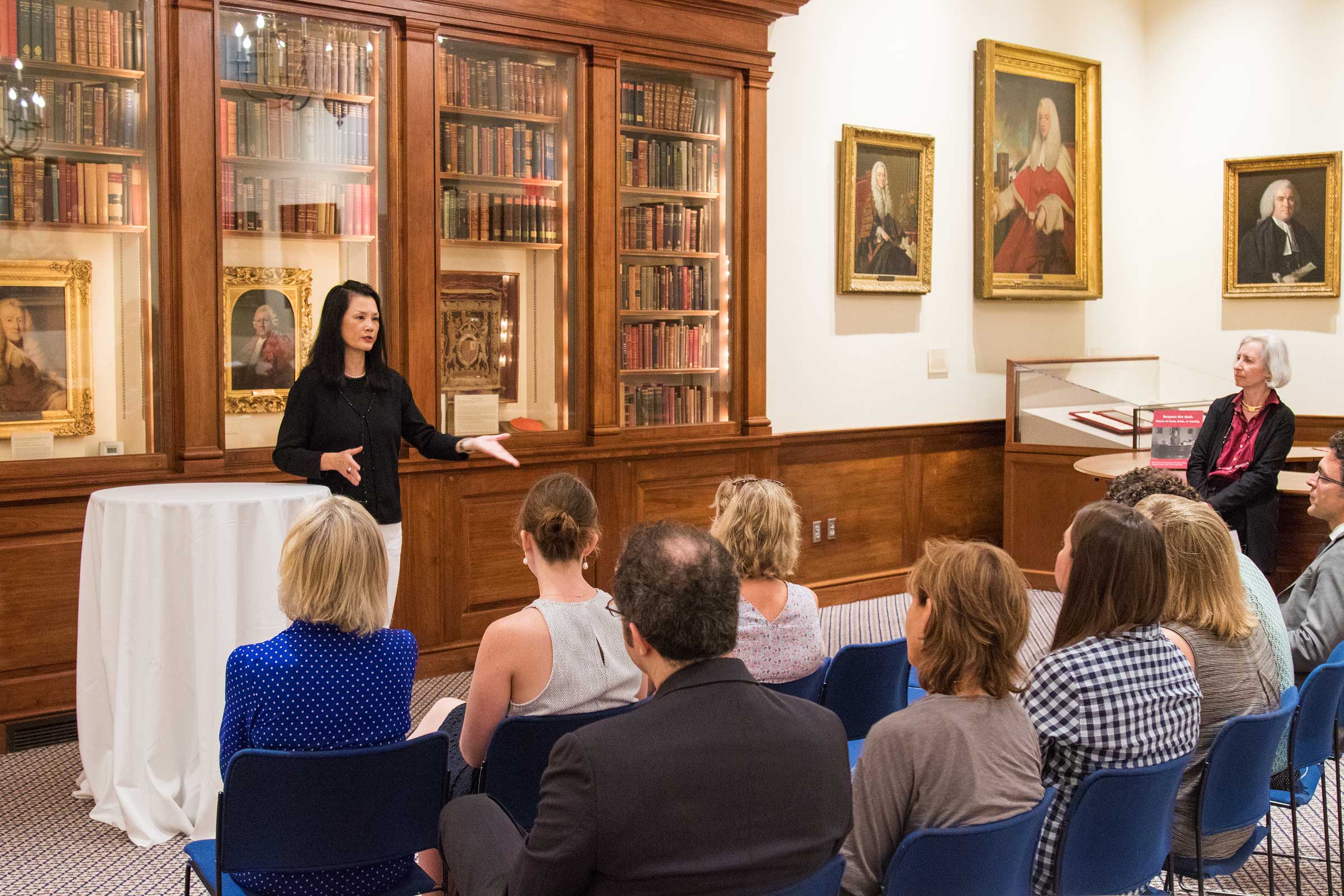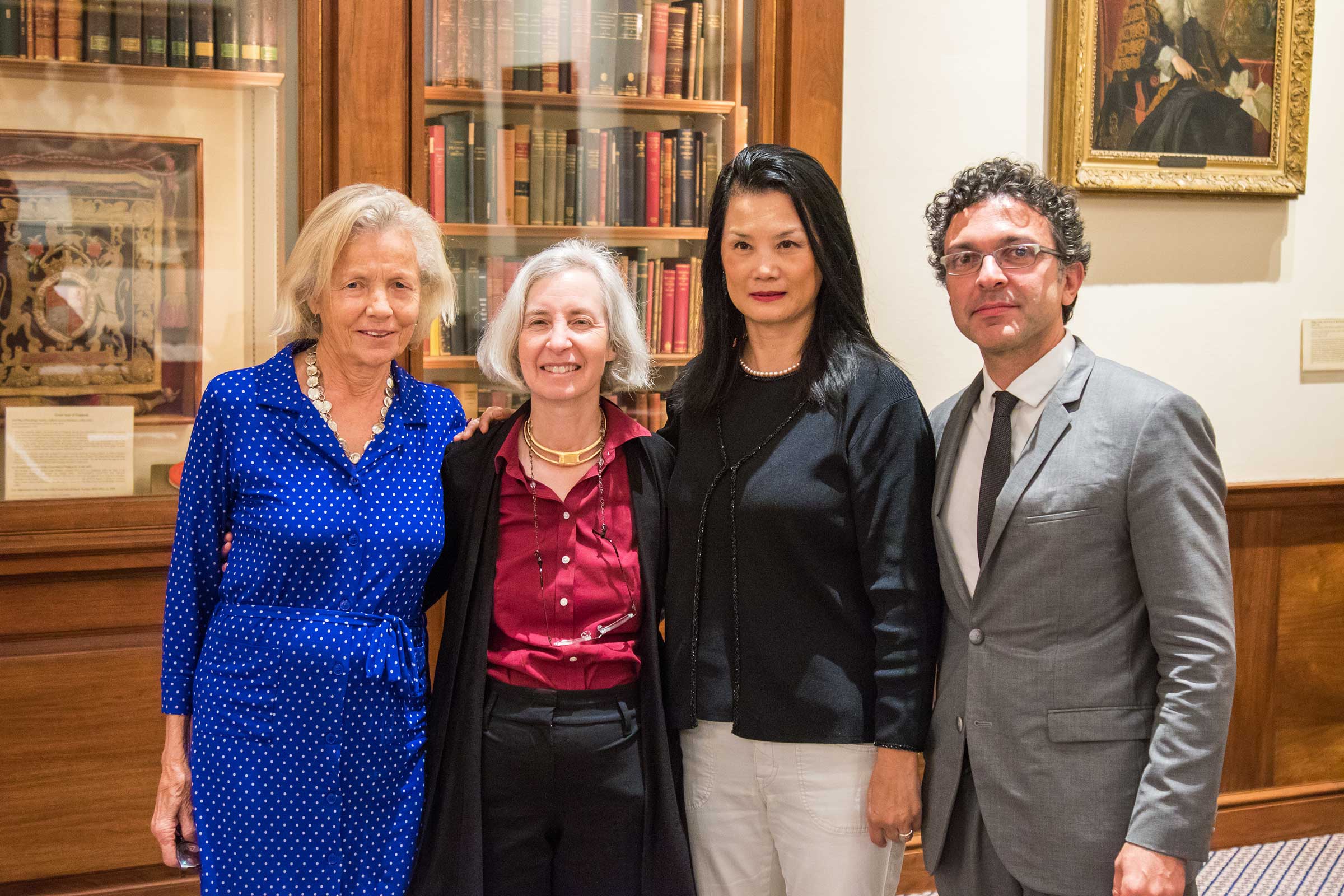The Child Advocacy Program (CAP) of Harvard Law School recently received a $250,000 gift from Children of All Nations (CAN). The gift, which will be distributed over five years, will provide funding to CAP to pursue its international human rights work on behalf of unparented children and their right to family. The gift demonstrates the long-standing relationship and commitment of the CAN organization, led by President and Chief Executive Officer Snow Wu, to CAP and its founder and Faculty Director Elizabeth Bartholet ’65.
To celebrate the presentation of the gift, Harvard Law School Dean Martha Minow joined the CAP staff, Wu, and other distinguished guests in the Caspersen Room of the Law Library on September 9. After thanking Wu and the CAN organization for their generous gift, Minow noted, “This gift is a testament to the power of partnerships between Harvard Law School and our community organizations. With this partnership, we can expand the work of Betsy Bartholet and CAP, all while continuing to build strong relationships with wonderful organizations like CAN.”
Austin, Texas-based CAN was established in response to the ever-changing needs of orphaned children around the world and the challenges adoptive families face. CAN, which is operated by Great Wall China Adoption Agency and founded in 1996 by Wu, is dedicated to improving the lives of children by reaching out to nations around the world to place children and give humanitarian aid globally.

Presenting the first installment of the gift, Wu noted that over her 10-year relationship with Bartholet she has developed a deep admiration for Bartholet’s advocacy and persistence in fighting for the rights of unparented children. “Betsy is a tireless fighter for the unparented children and willing to challenge UNICEF, the governments, and political figures who are preventing unparented children from finding homes, even when she is the only voice in the room,” said Wu. “She goes head on with them.” Wu went on to say that this gift signifies the trust that she has in Bartholet’s work and in CAP’s mission, which is to advance children’s interests through facilitating productive interaction between academia and the world of policy and practice, and through training generations of students to contribute in their future careers to law reform and social change. The money will be the beginning of CAN’s long partnership with and commitment to CAP and Harvard Law School, said Wu.
Bartholet said, “This gift represents liberation for CAP – enabling us to break free from the constraints of our limited budget to do the work that so needs doing. This is especially important given the politics of our work – which makes it so very hard to raise funds.”
Boston College Associate Professor of Law Paulo Barrozo S.J.D. ’09 and partner in CAP’s human rights work, also spoke. Barrozo identified the situation of millions of unparented children worldwide who are prevented from accessing loving and nurturing families as representing “the largest unrecognized human rights and humanitarian crisis of our time.” “When Professor Bartholet named this group ‘unparented children,'” Barrozo said, “she gave a name to their predicament the same way that Raphael Lemkin named some the atrocities of World War II ‘genocide.’” “Once we name an evil,” Barrozo continued, “we are one step closer to defeating it.” He believes that the work of CAP is especially important to solve this crisis, saying, “CAP is a critical player in finding homes for children trapped in institutional care situations who are being denied this basic right to family life.”
Also attending the ceremony was new CAP assistant director Crisanne Hazen. She joins CAP after 10 years with the Law Foundation of Silicon Valley in San Jose, Calif. Kathleen Moore, an incoming consultant, was also introduced at the ceremony. Her work will focus on assisting CAP with developing international human rights litigation aimed at breaking down the barriers to international adoption. The new CAN gift has made it possible to add Moore to the CAP team, and thus expand in key ways CAP’s international human rights work on behalf of children.
